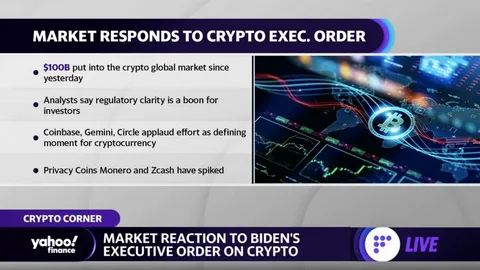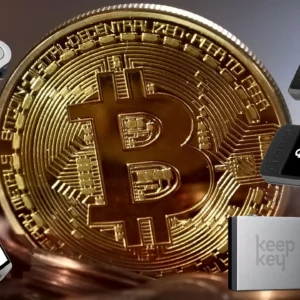Introduction
The world of cryptocurrency continues to evolve rapidly, fueled by innovation, market demand, and the need for regulatory clarity. Now, a new development has sparked significant attention among crypto enthusiasts and financial experts alike.
According to Jeremy Allaire, the CEO of Circle, former President Donald Trump may sign an executive order to ease bank involvement in crypto, potentially marking a major milestone in the cryptocurrency and blockchain industry. This possibility could reshape the way financial institutions engage with the growing world of digital assets.
In this blog post, we’ll explore what such an executive order could mean for the crypto ecosystem, the role of banks in this context, the perspective of Circle’s CEO, and the broader implications for the industry and investors. Let’s dive in
 .
.
Crypto and Banking: A Complex Relationship
The relationship between banks and cryptocurrency has always been a complicated one. On one hand, banks are wary of cryptocurrencies because they disrupt traditional financial systems and introduce decentralized networks that challenge their dominance. On the other hand, cryptocurrencies offer a new frontier of opportunity for banks to expand their services, tap into innovative markets, and provide value to tech-savvy customers.
However, regulatory hurdles and unclear legislation have often slowed banks’ involvement in crypto-related ventures. Circle CEO Jeremy Allaire recently made waves by suggesting that Trump may sign an executive order aimed at addressing these issues. Such a move would not only ease restrictions but also encourage banks to play a more active role in the crypto sector.
In the next sections, we’ll unpack what this potential executive order could mean for banks, the role of Circle in advocating for this shift, and how such developments could change the financial landscape.
The Potential Executive Order: What Could It Entail?
Jeremy Allaire’s recent comments have brought attention to the possibility of Trump signing an executive order aimed at easing bank involvement in cryptocurrency. But what might this executive order actually include? While specifics are still unclear, the potential goals of such a move are worth exploring.
- Regulatory Clarity: One of the primary reasons banks have hesitated to embrace cryptocurrency is the lack of clear regulations. An executive order from Trump could provide banks with well-defined guidelines on how they can engage with digital assets without running afoul of existing laws.
- Increased Participation: By easing restrictions, this order could pave the way for banks to offer crypto-related services, such as custody, trading, and lending. This increased participation could further legitimize the crypto industry.
- Global Competitiveness: If banks in the United States are given more freedom to engage with crypto, they could compete more effectively on the global stage. Countries like Switzerland and Singapore have already embraced crypto-friendly policies, and the U.S. risks falling behind if it doesn’t follow suit.
Jeremy Allaire has emphasized that easing bank involvement would not only help financial institutions but also benefit the broader crypto ecosystem by encouraging adoption, boosting liquidity, and fostering innovation. If Trump does sign such an executive order, it could be one of the most significant steps forward for cryptocurrency in the U.S.
Circle CEO’s Perspective on the Crypto-Banking Relationship
As the CEO of Circle, one of the most prominent companies in the cryptocurrency space, Jeremy Allaire is uniquely positioned to offer insights on the intersection of banks and digital assets. Circle is best known for its role in developing USD Coin (USDC), a leading stablecoin pegged to the U.S. dollar. Stablecoins like USDC serve as a bridge between traditional finance and the crypto world, making Allaire’s perspective especially relevant.
In his statements, Allaire has highlighted the importance of banks embracing cryptocurrencies and stablecoins to stay competitive in a rapidly changing financial environment. He believes that regulatory clarity—potentially through an executive order signed by Trump—could accelerate this process.
For Circle, increased bank involvement in crypto could open up new opportunities. Banks could integrate USDC into their operations, enabling faster, cheaper, and more efficient transactions. Additionally, this would give Circle greater legitimacy as a company that facilitates the convergence of traditional finance and blockchain technology.
Allaire’s remarks reflect a broader sentiment in the industry: that crypto and traditional finance are not mutually exclusive. By easing restrictions, banks could help drive the adoption of digital currencies, ultimately benefiting consumers, businesses, and financial institutions alike.
The Role of Banks in the Evolving Crypto Ecosystem
If Trump were to sign an executive order that eases bank involvement in cryptocurrency, it would mark a turning point for the industry. Banks have traditionally viewed crypto with skepticism, but their involvement is crucial for the growth and mainstream adoption of digital assets. Let’s explore the potential roles banks could play in a crypto-friendly future.
- Custody Services: One of the most significant opportunities for banks lies in offering custody services for digital assets. Institutional investors, in particular, require secure and regulated custody solutions, which banks are well-equipped to provide.
- Crypto Payments and Transactions: Banks could also facilitate cryptocurrency payments, enabling businesses and consumers to transact seamlessly using digital currencies. By integrating cryptocurrencies like USDC into their payment systems, banks could offer faster and more cost-effective services.
- Blockchain-Based Lending: Another area of potential growth is blockchain-based lending. Banks could use blockchain technology to streamline loan processes, reduce costs, and offer more transparent lending solutions.
- Collaboration with Crypto Companies: Easing restrictions would encourage banks to partner with crypto companies, creating a more interconnected financial ecosystem. Such collaborations could lead to the development of innovative products and services that benefit both industries.
The involvement of banks would also provide a layer of trust and stability to the crypto market, which has often been criticized for its volatility and lack of regulation. By legitimizing cryptocurrencies through their participation, banks could help bridge the gap between traditional finance and blockchain technology.
Implications for the Crypto Industry and Investors
The possibility of Trump signing an executive order to ease bank involvement in crypto has significant implications for the industry and its stakeholders. For the crypto market, increased bank participation would likely lead to greater liquidity and stability. As more financial institutions embrace digital assets, the market could attract a broader range of investors, including institutions that have so far remained on the sidelines.
For individual investors, this development could signal a new era of mainstream adoption. Greater involvement from banks could make it easier for everyday consumers to access cryptocurrency, whether through bank-integrated trading platforms or crypto-based payment systems. This, in turn, could drive demand and potentially increase the value of digital assets.
On a larger scale, such an executive order would reinforce the United States’ position as a leader in the global cryptocurrency market. By fostering innovation and encouraging banks to engage with crypto, the U.S. could set a precedent for other countries to follow.
However, it’s important to note that this move would not be without challenges. Banks and regulators would need to work together to ensure compliance with anti-money laundering (AML) and know-your-customer (KYC) requirements. Additionally, the transition to a more crypto-friendly financial system would require significant investment in infrastructure and education.
Conclusion: What Comes Next?
The idea that Trump may sign an executive order to ease bank involvement in crypto has sparked both excitement and speculation. If such a move does come to pass, it could mark a turning point for the cryptocurrency industry, opening the door for greater adoption, innovation, and collaboration between traditional finance and blockchain technology.
The potential benefits are clear: regulatory clarity, increased bank participation, and a more robust financial ecosystem. However, challenges remain, and the success of such an initiative would depend on careful planning and execution.
As we await further developments, it’s worth considering the broader implications of this potential executive order. What do you think about banks playing a more active role in the crypto world? Could this help or hinder the industry’s growth?
We’d love to hear your thoughts! Share your opinions in the comments below and join the conversation about the future of cryptocurrency and traditional finance.






